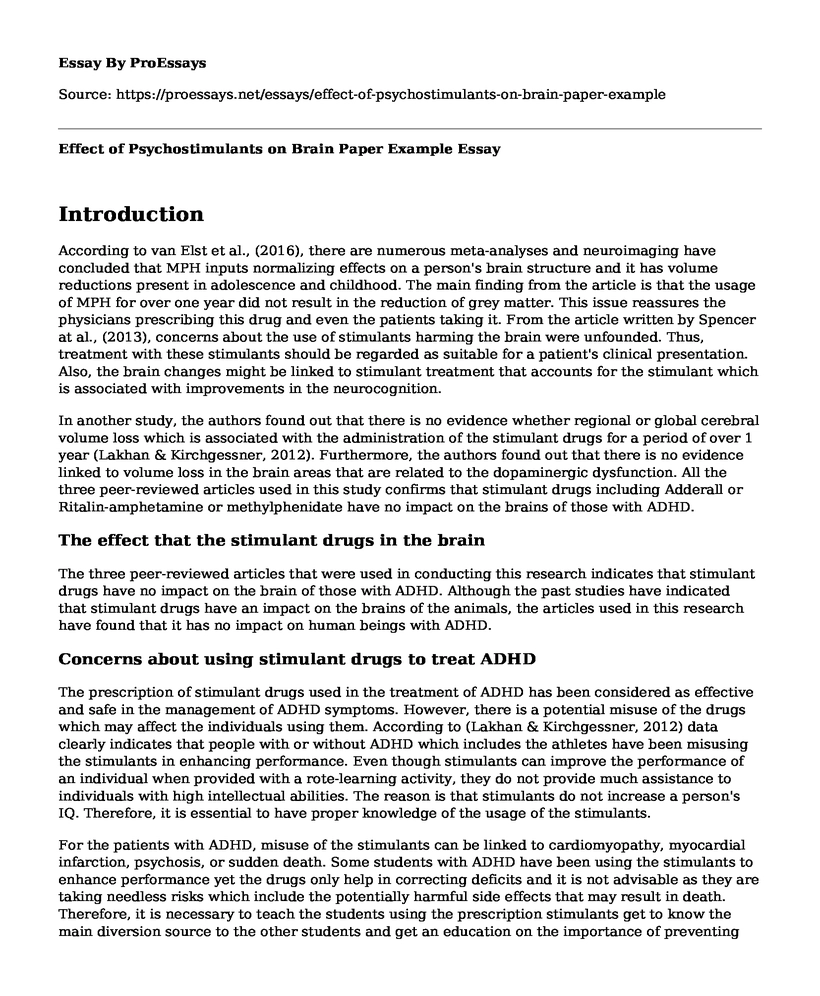Introduction
According to van Elst et al., (2016), there are numerous meta-analyses and neuroimaging have concluded that MPH inputs normalizing effects on a person's brain structure and it has volume reductions present in adolescence and childhood. The main finding from the article is that the usage of MPH for over one year did not result in the reduction of grey matter. This issue reassures the physicians prescribing this drug and even the patients taking it. From the article written by Spencer at al., (2013), concerns about the use of stimulants harming the brain were unfounded. Thus, treatment with these stimulants should be regarded as suitable for a patient's clinical presentation. Also, the brain changes might be linked to stimulant treatment that accounts for the stimulant which is associated with improvements in the neurocognition.
In another study, the authors found out that there is no evidence whether regional or global cerebral volume loss which is associated with the administration of the stimulant drugs for a period of over 1 year (Lakhan & Kirchgessner, 2012). Furthermore, the authors found out that there is no evidence linked to volume loss in the brain areas that are related to the dopaminergic dysfunction. All the three peer-reviewed articles used in this study confirms that stimulant drugs including Adderall or Ritalin-amphetamine or methylphenidate have no impact on the brains of those with ADHD.
The effect that the stimulant drugs in the brain
The three peer-reviewed articles that were used in conducting this research indicates that stimulant drugs have no impact on the brain of those with ADHD. Although the past studies have indicated that stimulant drugs have an impact on the brains of the animals, the articles used in this research have found that it has no impact on human beings with ADHD.
Concerns about using stimulant drugs to treat ADHD
The prescription of stimulant drugs used in the treatment of ADHD has been considered as effective and safe in the management of ADHD symptoms. However, there is a potential misuse of the drugs which may affect the individuals using them. According to (Lakhan & Kirchgessner, 2012) data clearly indicates that people with or without ADHD which includes the athletes have been misusing the stimulants in enhancing performance. Even though stimulants can improve the performance of an individual when provided with a rote-learning activity, they do not provide much assistance to individuals with high intellectual abilities. The reason is that stimulants do not increase a person's IQ. Therefore, it is essential to have proper knowledge of the usage of the stimulants.
For the patients with ADHD, misuse of the stimulants can be linked to cardiomyopathy, myocardial infarction, psychosis, or sudden death. Some students with ADHD have been using the stimulants to enhance performance yet the drugs only help in correcting deficits and it is not advisable as they are taking needless risks which include the potentially harmful side effects that may result in death. Therefore, it is necessary to teach the students using the prescription stimulants get to know the main diversion source to the other students and get an education on the importance of preventing stimulant diversion. Another concern is the students having drug abuse patterns, the stimulants posses a high harmful risk to them and this makes it necessary not to prescribe the stimulants to them since it might deter their prescription stimulants.
References
Lakhan, S. E., & Kirchgessner, A. (2012). Prescription stimulants in individuals with and without attention deficit hyperactivity disorder: misuse, cognitive impact, and adverse effects. Brain and behavior, 2(5), 661-677.
Spencer, T. J., Brown, A., Seidman, L. J., Valera, E. M., Makris, N., Lomedico, A., ... & Biederman, J. (2013). Effect of psychostimulants on brain structure and function in ADHD: a qualitative literature review of MRI-based neuroimaging studies. The Journal of clinical psychiatry, 74(9), 902.
van Elst, L. T., Maier, S., Kloppel, S., Graf, E., Killius, C., Rump, M., ... & Matthies, S. (2016). The effect of methylphenidate intake on brain structure in adults with ADHD in a placebo-controlled randomized trial. Journal of psychiatry & neuroscience: JPN, 41(6), 422.
Cite this page
Effect of Psychostimulants on Brain Paper Example. (2022, Dec 10). Retrieved from https://proessays.net/essays/effect-of-psychostimulants-on-brain-paper-example
If you are the original author of this essay and no longer wish to have it published on the ProEssays website, please click below to request its removal:
- The Gender Perspectives of Non-Profit Organization Leadership: Could Women Leadership Make More Committed Followers?
- Annotated Bibliography on Effective Psychiatric Diagnosis & Treatment Planning for Kyle
- Anxiety & Family: Bess' Story - Case Study
- Stigma & Mental Illness: Impacts & Discrimination - Essay Sample
- Essay on Erik Erikson's Theory of Psychosocial Development Explained
- Mental Health: Causes, Types, and Management - Essay Sample
- Free Essay Example on Reaction to Drug Dependent Patients







